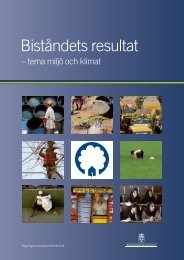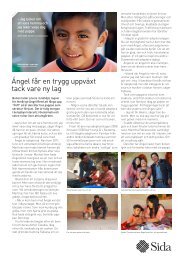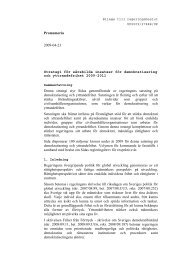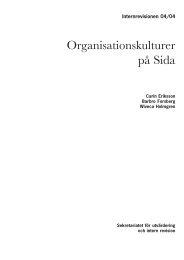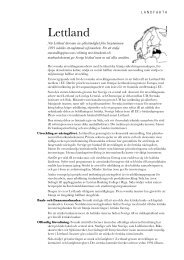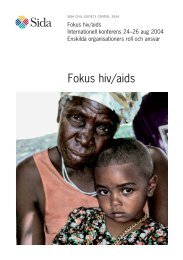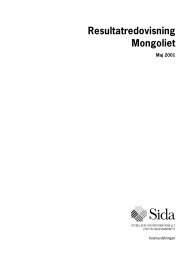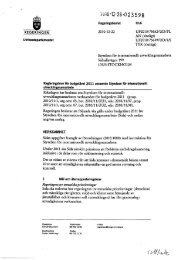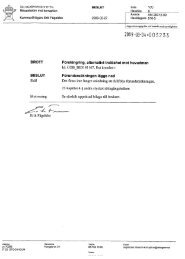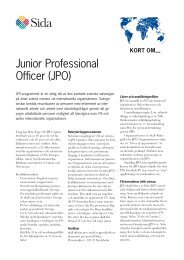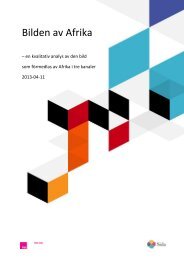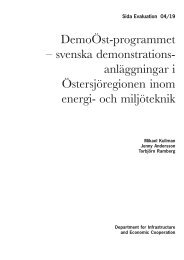Mid-Term Review of the AGIR Programme - Sida
Mid-Term Review of the AGIR Programme - Sida
Mid-Term Review of the AGIR Programme - Sida
You also want an ePaper? Increase the reach of your titles
YUMPU automatically turns print PDFs into web optimized ePapers that Google loves.
2 F I N D I N G S<br />
cial dependency is central to this process, it also risks <strong>the</strong> consolidation <strong>of</strong> a clientelistic<br />
relationship in which CSO partners establish a dependency on <strong>the</strong> intermediaries<br />
for capacity building, strategic planning and direction (harmonisation with <strong>the</strong> intermediaries’<br />
interests) and mobilisation for fund raising. Moreover, in long-term relationships,<br />
<strong>the</strong>re is also a risk <strong>of</strong> <strong>the</strong> loss <strong>of</strong> a more critical view by <strong>the</strong> intermediaries<br />
concerning <strong>the</strong>ir CSO partners due to a certain “routinisation” <strong>of</strong> <strong>the</strong> relationship –<br />
this can truly endanger <strong>the</strong> capacity streng<strong>the</strong>ning process. Ideally, it was discussed<br />
earlier, that a partner selection process that was more open could allow for <strong>the</strong> exposure<br />
to new partners for <strong>the</strong> intermediaries, thus avoiding an excessive routinisation<br />
<strong>of</strong> <strong>the</strong> intermediary-CSO partner relationship.<br />
Some questions can help to unpack <strong>the</strong> critical points concerning this dependency<br />
issue:<br />
To what extent have <strong>the</strong> intermediaries been self critical in analysing <strong>the</strong><br />
strengths and weaknesses <strong>of</strong> <strong>the</strong>ir past relations with CSO partners that transited<br />
to <strong>AGIR</strong> funding? To what extent have <strong>the</strong>y tried to address <strong>the</strong>se drawbacks<br />
(if at all)?<br />
To what extent was <strong>the</strong> selection <strong>of</strong> “old CSO partners” mainly a way <strong>of</strong> reducing<br />
<strong>the</strong> potential risks <strong>of</strong> working with new partners as well as assuring <strong>the</strong><br />
achievement <strong>of</strong> results in a relatively short period <strong>of</strong> time but at <strong>the</strong> expense <strong>of</strong><br />
overlooking o<strong>the</strong>r potentially better candidate organizations?<br />
To what extent will any <strong>of</strong> <strong>the</strong>se partner CSO organisations, who have previously<br />
worked with <strong>the</strong> same intermediaries for extended periods <strong>of</strong> time, be<br />
ready to be graduate after <strong>AGIR</strong> ends?<br />
Most <strong>of</strong> <strong>the</strong>se questions remain unanswered and as such were a cause for concern<br />
among some donors and informants interviewed by <strong>the</strong> review team (and to which <strong>the</strong><br />
review team concurs) that <strong>the</strong>re is a real potential risk <strong>of</strong> <strong>the</strong> consolidation <strong>of</strong> a clientelistic<br />
relationship that could help perpetuate this dependency relationship.<br />
Apart from <strong>the</strong> entry conditions for additional donors (re: agreement with core funding<br />
and good donorship principles), <strong>the</strong> programme also needs to take into account<br />
that <strong>the</strong> process <strong>of</strong> funding such a programme can be problematic for some donors<br />
due to <strong>the</strong> process used by <strong>AGIR</strong> for <strong>the</strong> selection <strong>of</strong> partner organisations. As some<br />
external donors mentioned, it would be difficult to fund <strong>AGIR</strong> because <strong>of</strong> <strong>the</strong> uncompetitive<br />
process <strong>of</strong> CSO partner selection, which could be interpreted as condoning a<br />
lack <strong>of</strong> transparency in <strong>the</strong> process. This is something to take into account if <strong>the</strong><br />
<strong>AGIR</strong> programme is willing to attract and add additional donors, since some <strong>of</strong> <strong>the</strong>m<br />
will tend to present preconditions for joining.<br />
2.6.2 Reaching a Sustainable Level <strong>of</strong> CSOs and Their Participation in <strong>AGIR</strong><br />
The overall structure <strong>of</strong> <strong>the</strong> programme, with intermediaries heading <strong>the</strong> subprogrammes<br />
and working directly with CSO partner organisations, has so far been a<br />
relatively successful working model for streng<strong>the</strong>ning <strong>the</strong> general capacity <strong>of</strong> civil<br />
society. As discussed earlier, coverage <strong>of</strong> <strong>the</strong> main <strong>the</strong>matic areas central to a strong<br />
civil society in Mozambique has been addressed through <strong>the</strong> selection <strong>of</strong> CSOs working<br />
in <strong>the</strong> relevant areas. As a <strong>the</strong>ory <strong>of</strong> change this approach <strong>of</strong> intermediaries that<br />
66




